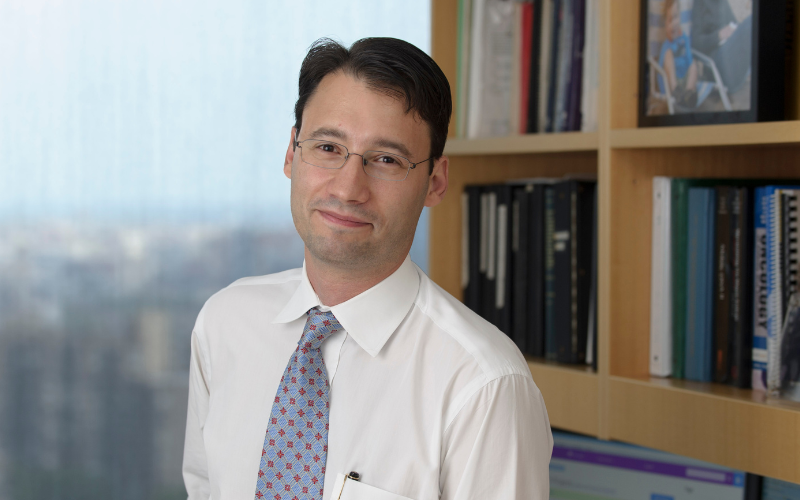
By: Shannon O'Connor
Science to advance treatments for children with cancer has made incredible strides, but the causes of genetic mutations that lead to the development of cancer are still poorly understood. Alex’s Lemonade Stand Foundation (ALSF)-funded researcher Alex Kentsis, MD/PhD, of Memorial Sloan-Kettering Cancer Center in New York, and his lab are investigating those fundamental causes, to find cures for all childhood cancers. Recently, he’s made a breakthrough discovery about solid tumor development that has led to a clinical trial.
Cancer is driven by abnormal changes (also known as mutations) in the DNA. There are all sorts of actors in this mutation process, including a molecule called PGBD5. PGBD5 jumping around and rearranges the genetic instructions in cells to combat the mutation process. While this is a normal cell process, the activity of PGBD5 creates natural breaks in DNA, which can contribute to the growth of certain childhood solid tumors.
With a Reach Grant from ALSF, Dr. Kentsis began his search for a safe, therapeutic strategy that would inhibit the rearrangement and stop solid tumors from forming. Dr. Kentsis investigated elimusertib, the oral drug designed to block some of the enzymes needed for cell growth.
In 2021, Dr. Kentsis and principal investigator, Dr. Michael Ortiz, opened a Phase I clinical trial for elimusertib. The study will test elimusertib’s effectiveness in children who express the PGBD5 mutation and have solid tumors that have relapsed or do not respond to treatment.
“We have lots of chemotherapies now that we use in patients, but even if they’re effective, all of them come with significant toxicities that can be lifelong,” said Dr. Kentsis. “We're trying to develop new treatments that are not only more effective, but also safe.”
In Dr. Kentsis’s lab, they don’t just study solid and bone cancers. They are performing research to understand the fundamental causes that drive a variety of childhood cancers. Before Dr. Kentsis was awarded his Reach Grant to bring a promising therapeutic option to clinical trial, he was the recipient of an ALSF ‘A’ Award that focused on leukemia and blood cancers. This research is continuing in his lab today, with a collaboration that may enable a new clinical trial on the horizon.
And more clinical trials are needed for kids with cancer. Many forms of treatment are either outdated or dosed for adults, so research with an emphasis on preclinical studies is imperative. These only happen with funding. ALSF grants give researchers like Dr. Kentsis the opportunity to pursue their innovative theories and provide kids with cancer more clinical options.
“ALSF and I share the push to study a variety of childhood cancers. The main focus should be on discovering the fundamental molecular causes of cancer, regardless of whether those are blood cancers or brain tumors. That’s what makes these types of grants so important,” said Dr. Kentsis.
Even outside of his research, Dr. Kentsis demonstrates the impact of getting kids safe treatment. Recently, Dr. Kentsis returned from Poland, where he was helping to evacuate children with cancer from Ukraine. Born in Moldova and fluent in Russian, Dr. Kentsis was a prime candidate to bring children into other countries so they could receive the safest treatment available.
“I get a great deal of satisfaction from being able to help kids and their families through a difficult, life-threatening experience,” said Dr. Kenstis.
Whether abroad or in his lab, Dr. Kentsis is another example of ALSF’s mission in action – empowering everyone to help cure childhood cancer.

